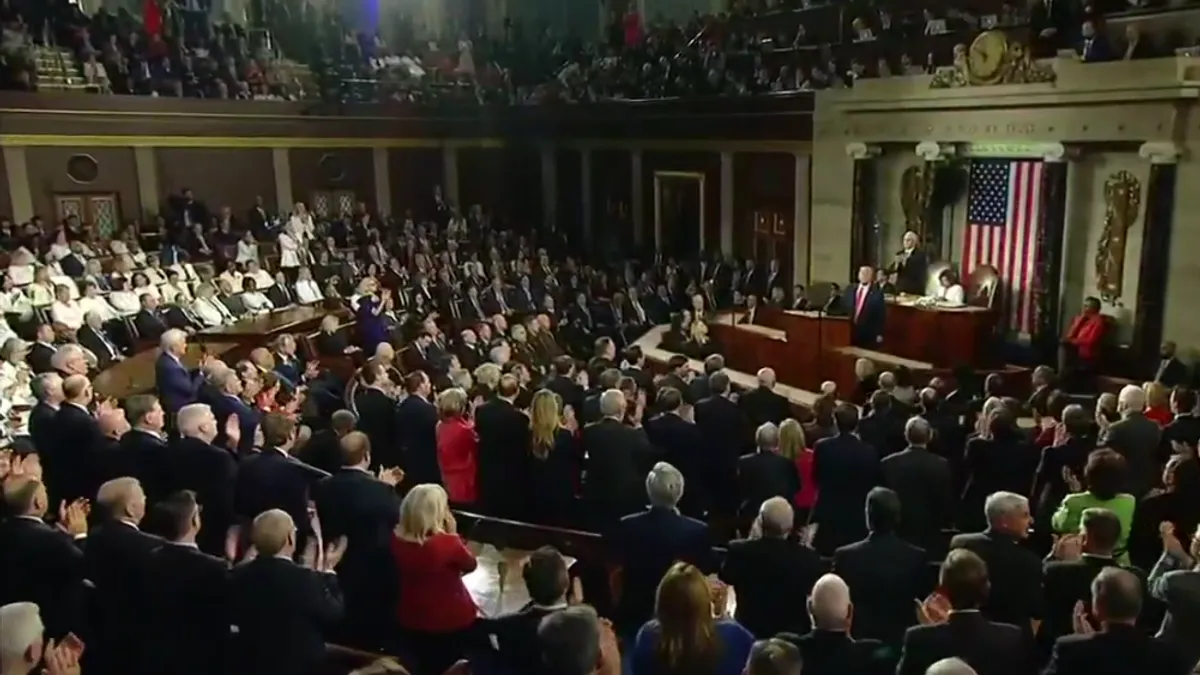President Donald Trump addressed the nation Tuesday night in a much-anticipated State of the Union speech following the conclusion of Senate impeachment proceedings this week, briefly touching on school choice and private scholarship tax credit programs.
“For too long, countless American children have been trapped in failing government schools,” Trump said, calling on Congress to pass the Education Freedom Scholarships and Opportunities Act. He pointed to 18 states, such as Florida and Ohio, that have already passed similar tax credit incentives.
The Education Freedom Scholarships program, which U.S. Secretary of Education Betsy DeVos has been pushing since last year, would give $5 billion in annual federal tax credits for businesses and individuals who voluntarily donate to organizations providing private school scholarships.
“Education freedom is inevitable,” DeVos said in a statement to Education Dive, saying the proposal is the “best, most direct way” for school choice. “I’m grateful to the president for his strong support of this proposal from day one and look forward to Congress acting quickly on this bipartisan issue and putting students and their needs above all else.”
However, Congress’ 2020 budget, which included notable increases in education funding for other areas, set aside no funds for the scholarship program, suggesting it continues to face an uphill battle in both the House and Senate. Trump also pointed to opposition on the state level, including from Pennsylvania Gov. Tom Wolf, who vetoed state legislation last year that would have expanded a similar program.
Opponents of the plan worry it’s another push from the administration to siphon away public funds for privatized education that has little accountability and oversight.
“Their voucher proposal is not about helping kids get quality education, it’s about getting public dollars into privately held and managed hands by creating another publicly funded system of education, while we’re not doing a good job of funding the one that we currently have," said Sasha Pudelski, policy advocate from AASA, The School Superintendents Association.
National Education Association President Lily Eskelsen García agreed.
“Rather than starving resources from the public schools that 90% of America’s students attend, we need to properly resource our neighborhood public schools,” Garcia said in a statement, pointing to areas in public education that could benefit, such as tempering large class sizes, improving textbooks and curriculum, and better funding support services like after-school, health and nutrition programs.
In defending the program, DeVos pointed to a recent poll from American Federation for Children, a school choice advocacy organization, showing that 69% of voters support the concept of school choice and 78% support Education Freedom Scholarships. John Schilling, president of the organization, said the program “showed the sharpest increase” in support compared to last year.
But in another poll released earlier this week by the National School Boards Action Center, voters across party lines favored preserving public funds for public education — a question that could eventually be addressed on a federal level in the U.S. Supreme Court case Espinoza v. Montana Department of Revenue.
In the NSBAC poll, a majority of voters across the political spectrum said they would not vote for a 2020 presidential candidate in favor of taking away public school funds to finance private, religious and home school education.
Almost two-thirds of those surveyed, including a majority of Democrats and a little less than half of surveyed Republicans, said funding for public schools should be increased, which NSBAC Chief Advocacy Officer Chip Slaven said “clearly suggests” the public “does not want” proposals like Education Freedom Scholarships.
Overall, experts say there has been increasing support from both Democratics and Republicans to shift the focus back to local public schools, pointing to recent teacher strikes and a recession drawing attention to the job market and student preparedness, or lack of, as catalyzing reasons.
And while education has not been on the top of the agenda for candidates to address in previous elections, this time seems different to many who think it’s finally become “a big issue,” with Democratic candidates even holding an educational forum in December.
Others like Pudelski aren’t yet convinced American leaders are taking public educators’ concerns seriously, as bipartisan federal programs like the Individuals with Disabilities Education Act continue to go underfunded. Nina Rees, president of the National Alliance for Public Charter Schools, suggested boosting spending for the federal Charter Schools Program, Title I, IDEA and Pell Grants as ways to "immediately help students."
If candidates really want to get the educators’ and parents’ votes, as well as those of students old enough to vote, both parties need to “step up to the plate,” Slaven said.





















